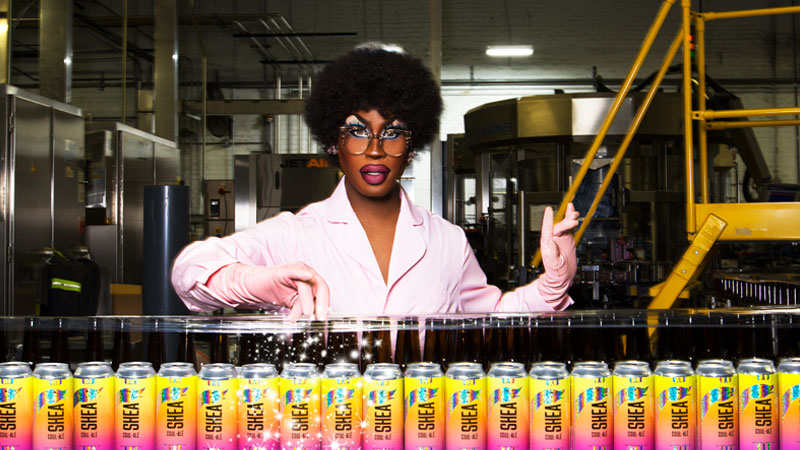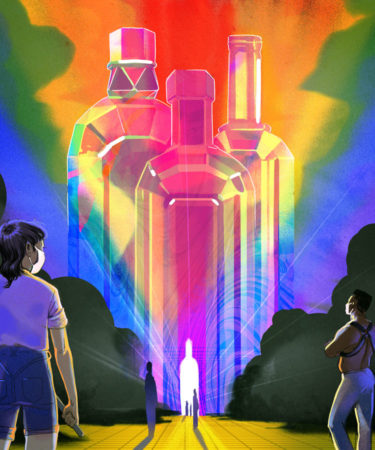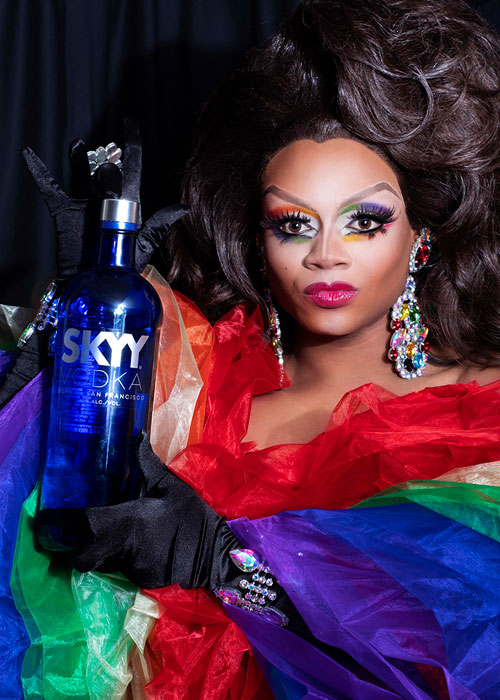Amidst social upheaval, Pride festivities are taking new shapes and forms — or maybe they’re just going back to what they once were. As the country simultaneously grapples with the Covid-19 pandemic and protests against police violence, liquor brands and organizations alike are rethinking how to celebrate Pride, and reconsidering what the month actually stands for. For some participants, Pride is a month-long party celebrating gay identity; for others, it is a political moment commemorating the ongoing struggle for LGBTQ+ rights. For liquor brands, Pride has long been a branding bonanza — but the presence of rainbow-branded capitalism is coming under increasing scrutiny.
With parades and parties cancelled across the country and Pride taking on a political new tone, change is clearly afoot. In this evolving landscape, how has the liquor industry gotten involved in Pride’s 2020 festivities, and what does this year’s altered celebration mean for the future of Pride?
Examining the Evolution of Pride
Since LGBTQ+ history remains untaught or erased in most of the United States, some Americans may not even be aware of how Pride month got its start. The event has been held to commemorate the protests against police that began at the Stonewall Inn, a bar historically frequented by LGBTQ+ people, in New York’s Greenwich Village on June 28, 1969. The apocryphal and oft-debated story is that a Black trans drag queen named Marsha P. Johnson threw the first brick at the NYPD in retaliation for a brutal raid of the venue, catalyzing days of riots in that area of Manhattan. This is widely viewed as the beginning of what eventually turned into a larger project of gay liberation throughout the country — a movement that to this day fights for the threatened civil rights of sexual minorities. Since this gay revolution began in bars, it’s no surprise that liquor brands have been in one way or another involved in Pride celebrations from the very beginning.
Over the course of three decades, Pride has been metamorphosed from a protest into a family-friendly block party with the support of banks, brands, and a smattering of Fortune 500 companies — a far cry from the event’s radical roots. What started with DIY floats made of cardboard and crepe paper in 1972, has now transformed into elaborate liquor brand-sponsored floats that range in cost from $10,000 to $35,000, according to The New York Times. Vodka brands specifically have had a long history of supporting these much tamer Pride bacchanals through charitable donations, partnerships, and promotions with individual bars, and specially designed (usually rainbow) bottles. Given that shift away from discussions of social justice and into celebration, Pride has been criticized by some in the queer community as a marketing holiday.
However, in recent years some LGBTQ+ activists have attempted to “take back” Pride. Last year’s Queer Liberation March in New York City, formed as a response to the more apolitical gay celebrations, rivaled the Pride parade in size and attempted to grapple with the continued police violence perpetrated against LGBTQ+ people and the epidemic of murders of transgender women of color in the United States. (Debates about police presence at Pride and the rainbow-washing of police departments in the United States have raged within the LGBTQ+ community for years.) A backlash to the more generic corporate-sponsored Pride is now quite apparent.
In 2020, Pride is undergoing yet another reckoning, catalyzed by geopolitical events. The official Pride parade in New York City was cancelled on April 20 due to the coronavirus, with analogous Pride celebrations across the United States following suit shortly thereafter. In-person drag showcases are being replaced with smaller-scale digital shows put on by local performers and massive online parties with celebrity guests, like the Global Pride Livestream to be held on June 27.
As protests against police brutality began in the wake of the killing of George Floyd, Breonna Taylor, and several other Black Americans, LGBTQ+ activists are also joining Black Lives Matter demonstrations in an attempt to revitalize the liberatory political roots of Pride, remembering how the struggles of Black people and queer people are often interrelated, interconnected, and overlapping. It was Black and Latinx transgender people who began the Stonewall rebellion, after all.
Given this new terrain, liquor brands will now have to figure out revised strategies for activism and support of the LBGTQ+ community — but not every brand seems up to the task.
Where Are the Liquor Brand Sponsorships?
Now that the year’s major Pride parades have been cancelled, some brands are reconsidering how to show their support for the LGBTQ+ community. Some alcohol brands have redirected the funds that would have been geared toward high-profile public events toward charitable efforts and online campaigns.
“Before the COVID-19 crisis hit, we were well into the final planning stages of a parade float and two large experiential footprints inside each festival, along with a digital campaign featuring important LGBTQ voices,” a Skyy Vodka representative tells VinePair. Despite mass cancelations of Pride festivities, Skyy said it felt it was important to continue to act as the official vodka sponsor for the Los Angeles and New York City Pride organizations, which help to fund charitable organizations like and Princess Janae Place, Educational Alliance, and the Queer Detainee Empowerment Project, and will produce events like the Human Rights Conference.
“This Pride we are also centering and prioritizing Black queer people who need us all more than ever,” Skyy added. “In addition to our support of The National Black Justice Coalition, this year we will be changing our online branded banner advertising for Pride to display a simple, unbranded message: Black Trans Lives Matter. The non-branded banners will direct to organizations dedicated to protecting and defending the human rights of Black transgender people.”
Another brand embracing virtual Pride is Truly Hard Seltzer. The company will be launching a digital content series titled “Truly Proud,” which will address anti-LGBTQ discrimination alongside a newly announced partnership with GLAAD: “We’ve been planning [this partnership] for a long time and though our original Pride campaign plans certainly shifted due to Covid-19, we’re still excited to show up with the revised campaign we’ve created and take a stand to support LGBTQ+ workplace equality,” a brand rep told VinePair. And Truly is putting its money where its mouth is: The brand is kicking off its new collaborations with GLAAD by donating $100,000 to support the organization’s ongoing initiatives.
It’s not just vodka and hard seltzer brands getting involved. Goose Island Beer Co. has recently announced its Shea Coul-Ale collaboration with RuPaul’s Drag Race superstar Shea Couleé. The outspoken drag activist, a vocal supporter of the Black Lives Matter movement, will donate a portion of the profits made from the collaboration to TransTech Social Enterprises.

But other brands haven’t yet committed to participating in this reboot of Pride. As of June 15 — halfway through Pride month — a representative for Smirnoff was unable to provide information about the brand’s Pride arrangements, but indicated that the company was in the process of formulating revised plans. Meanwhile, a representative from Absolut Elyx said that it would be “unable to participate” in this article by press time. Tito’s Vodka did not respond to requests for information about the brand’s Pride plans.
Ultimately, some in the drinks industry say they have become dubious of the Pride corporate industrial complex, and are fine seeing brands’ commitments fall to the wayside. “Pride has to go back to what it was; it’s going to have to be about social justice and equality,” says a New York-based bartender who wished to remain anonymous as he was not authorized to speak on behalf of his employer. Although he admitted that certain promotions are helpful to bars and demonstrate a minimum level of commitment to the community, he felt that Pride “can’t just be about liquor sponsorships anymore. These fake-ass companies act like they’re advocates but when June is over, they go back to the same campaigns they’ve been doing; for them it’s a marketing situation. It’s all fake if you ask me.”
“The significance [of these sponsorships] are mostly for brand recognition anyway; it’s more for them than for us,” agrees John Lowther, a bartender who’s worked at and managed several LGBTQ+ venues in Brooklyn. “A lot of the time [these brands] are excited to have a new float or a new bottle with a rainbow on it,” he says. “But more often than not, a lot of us feel that they aren’t doing anything meaningful for the community. As a bartender, I feel pandered or condescended to by a lot of these efforts.”
Those in the liquor industry who continue to support Pride seem to have gotten the message, as many efforts now have a charitable component to them — and are focused on addressing issues of social inequality. If Pride celebrants in the future continue to prioritize the emancipatory politics of the events over the joyful, corporate-funded street parties — then perhaps gone are the days of shallow endorsements that lack a tangible, measurable impact.
This story is a part of VP Pro, our free platform and newsletter for drinks industry professionals, covering wine, beer, liquor, and beyond. Sign up for VP Pro now!

